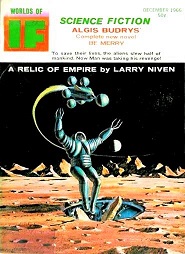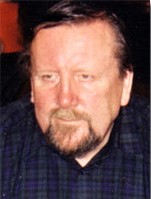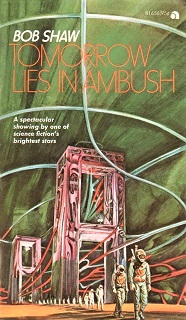
 “Call Me Dumbo”
“Call Me Dumbo”
by
Bob Shaw
(1931-1996)
(novelette, originally in IF, December 1966)
by Dave Truesdale
July of 2017 saw the publication of Go Forth and Multiply: Twelve Tales of Repopulation, edited by Gordon Van Gelder. This themed reprint collection features classic stories by the likes of John Brunner, Poul Anderson, Kate Wilhelm, Damon Knight, Richard Wilson, and seven others. For the complete list of stories and authors a full review of the book can be found at Tangent Online here.
In his introduction, editor Van Gelder bemoans the fact that he was unable to include Bob Shaw’s “Call Me Dumbo” when he writes, “I note with regret that I was unable to secure the rights for reprinting Shaw’s story in this book.”
Having read “Call Me Dumbo” in Shaw’s collection Tomorrow Lies in Ambush years ago (Ace, 1973, pb, it was the lead story), I thought readers might like to know what the story was all about, and why editor Van Gelder sought it for his new collection.
The story begins from Dumbo’s point of view and her confused thoughts:
“The thoughts were strange and they hurt.
“My husband is called Carl—and that is a nice name. My three little sons are called David, Aaron and John—and those are nice names. But I’m called Dumbo—and that sounds silly. It isn’t even like a real name. How did I get it in the first place?”
She then goes about her morning business of setting out five plates of hot porridge, and calls to her boys who are tumbling about in the flower garden to come into their white-washed stone cottage (surrounded by a white picket fence) for breakfast. She admonishes one of them not to trample her beautiful red roses, and he shouts back, “You mean those green things?” The other two boys laugh.
Carl, the boys, and Dumbo now seated and eating their porridge and griddlecakes, Dumbo tries to make conversation by assuring the boys that they will have a baby girl, that they must have a baby girl next, to which Carl explodes in harsh agreement as if the topic is a sore point with him. Dumbo reacts to Carl’s display calmly:
“Dumbo smiled happily and took her seat. Carl had given her the reassurance she wanted. It was good to know she was loved, and yet the disturbing new thoughts thudded continuously in her head. Who ever heard of a name like Dumbo? She should be called something different. A nice womanly, motherly name. Something like…perhaps…Victor…no, that’s a man-name…Victoria would be nice.”
In a bold move for her, Dumbo tells Carl she doesn’t want to be called Dumbo any more, and now wants to be called Victoria. Taken aback, for Dumbo is usually docile and meek, bending to his will unquestioningly, Carl asks if she has been taking her medicine. Dumbo lies and says she has but Carl doesn’t believe her. Ordering her to her bedroom, Carl then fills a hypodermic from an egg-shaped vial and injects the “medicine” into her throat. Dumbo is once again her happy, dull-minded self. The reader is now filled with as many questions as to what is going on as was Dumbo when her medicine began wearing off. What is going on here?
Soon enough Shaw drops hint after hint as to the world Dumbo, Carl, and the boys inhabit, though Shaw makes it hard to piece them together into a coherent picture. Until, that is, Dumbo’s medicine inexplicably begins wearing off again sooner than expected. Her drug-dampened curiosity now set free, she decides, against Carl’s wishes, to follow him to the village where he goes periodically for supplies. This is where Shaw decides to let the reader—and Dumbo—discover the startling answers to her condition as well as the dire situation facing Carl and the boys, and Dumbo’s critical role, for she is the key to humanity’s survival.
Having followed Carl to the “village,” and watching him from afar, Dumbo learns there is no village, but what appears to be the mostly intact remnants of a crashed starship. Returning home, she sneaks out on her own a second time, this time enters and begins exploring the ship, and finds a handful of empty spacesuits, organ banks still functioning from reserve power, and much more. Head swirling with this new reality, filled with new questions while pieces of old ones now become clearer as the ship begins to bring back familiar memories, she fails to notice that Carl has followed her.
Before ending in a violent confrontation with Dumbo knocking Carl senseless with the butt of a rifle after he has struck her and chased her through the ship, Carl explains to Dumbo who she really is, what they are doing on this uninhabited world, and what he is doing to preserve humanity through her, for, in his own egotistical self-delusion and god complex, he tells her he is “a holy giver of life.”
Carl tells Dumbo that they were on their way to another world in the midst of war with a ship filled with medical supplies—and organ replacements of every conceivable kind—when they were hit and subsequently crashed. There were only the two of them as the nameplates on their spacesuits read: SURG./CDR. CARL VAN BUYSEN and LT./CDR. ROBERT V. LUCAS. Carl was the ship commander and surgeon and the lieutenant commander was one Robert Victor Lucas. In order to insure the continuation of the human race, with no other options open to him, and using the latest technological medical resources available to him aboard the ship, Carl subdued and operated on Victor. Carl turned Victor into Victoria via a complete sex change (vaginoplasty), including hormone replacement. In the following passage, Carl explains to Dumbo how she came to be (note how Carl refers to himself in the third person): “There we were on a completely empty world. A clean, fresh world, ideally suited for life—and there was nothing for us to do but grow old and die..” Carl’s voice grew louder. “And Carl would not allow that. It would have been a terrible wrong—because the only obstacle standing in the way of life was a few ounces of redundant male flesh.
“I had everything that was needed—the organ bank was in good condition then. The individual power cells are failing now and I’m discarding more and more units every week, but at that time I was able to produce a usable set of basic female organs and glands for you. One hypno session after the operations and a weekly shot of an LSD derivative took care of the rest.
“That’s your illustrious background. How do you like that mother.”
Somewhat surprisingly, Dumbo replies with the following: “I’m sorry, Carl—you can’t punish me like that. Don’t you see? The things you have just said might have destroyed Victor Lucas, but he can never hear them. He doesn’t exist any more. I’m…Victoria Lucas.” … And a few lines later she says: “I ought to hate you but you did too good a job on me with those glands. I really am a woman—and I’m prepared to go on being your wife.”
Rather than being relieved at Victoria’s new-found acceptance as a woman, he bridles at her use of the word “wife,” and what it implies. Carl’s distaste, his disgust at the thought of touching Victor/Victoria rises to his lips like bile, projecting (and revealing) his own feelings of her onto how other men would react to Victor as a man who has undergone a vaginoplasty and is now a fully functioning woman:*
“Think instead of how lucky you are. Yes, lucky! No man could ever touch you and still keep his food down yet, thanks to the wonders of medical science, you’ve had three children to as many different men. And you’ll go on having them until you produce the girls we need.”
*(Note: I use the medical term vaginoplasty for a sex change rather than other possible terms like transgendered or transsexual as they have fluid meanings today, and there are subset terms under these umbrella designations, defining or reclassifying (among other terms) the older, simpler term of sex change, which is now frowned upon in certain quarters in lieu of “sex-reassignment surgery” or even “gender confirmation surgery.”)
It is shortly after these revelations and angry dialogue that Carl chases Victoria through the ship as she attempts to flee, he hits her, and she knocks him unconscious with a rifle butt. With great effort she drags Carl back to the cottage (which she now realizes is nothing more than a shack constructed from ship parts, her rose garden is just weeds, and there is no picket fence).
In the final scene, Carl awakens in his bed, his face tender and sore from the rifle blow. Victoria is bustling about their shelter, cheery and happy as if nothing has happened. Attending dutifully to Carl, she lets him know she has not been taking her shots, that she wanted to be fully aware and cognizant for a surprise she has for him. A few moments later the nearby starship explodes, Victoria having decided to destroy it—organ banks and all (save for a fresh supply of her “medicine”)—with multiple timed detonations. She then injects herself with the memory-killing LSD derivative and waltzes out of the bedroom, leaving Carl in shock. But Victor/Victoria/Dumbo’s world is now a carefree one once more and everything is right with the world as Shaw shows us in the story’s final three lines:
“Dumbo smiled as she watched the boys at play. She hoped the next child would be a girl because that was what Carl wanted more than anything in the world.
“And all she wanted was to be his wife.”
Needless to say, there is a lot more to this story than meets the eye. Shaw has chosen the well worn theme of repopulation to hang his story on, and uses it to explore the theme of sexual identity—and one man’s visceral reaction to it. The commander of the downed starship, also a surgeon, is faced with a critical decision based upon severely limited options. Allow he and lieutenant commander Lucas to merely exist on an uninhabited world until they die, or try to begin the human race anew. Shaw chooses the latter option, but with the deeply flawed character of Carl, who takes on a god complex on the one hand, while his choice to repopulate the planet over time has unforeseen consequences, not least of which is the exposure of his deeply ingrained beliefs when it comes to accepting the woman he has made from a man, on the other hand. Was Carl’s choice to repopulate the planet such as he did (perhaps the only option) a wise one? Was it worthy of the sacrifice and consequences he would unknowingly and eventually be forced to face?
And what of Dumbo? She is an extremely sympathetic character, tossed this way and that by the drug which defines how she views the world and her place in it. And when she discovers the truth of who she was and who she now is, what are we to make of her final decision to freely adopt the role of the cheerful, obedient wife, living only to please Carl and to be his wife?
The choices and attitudes Shaw presents to the reader for both Carl and Dumbo are sure to elicit sympathy at some points (especially toward Dumbo) and if not anger, then outright outrage at others (especially toward Carl). But there is very possibly anger to be expressed toward Dumbo as well, for her willing acceptance to continue as the loving Dumbo character in overt subservience to the sometimes impulsive, capricious, and physically abusive Carl. The issues raised in this virtually unknown story are more than relevant today, just over half a century since its first magazine appearance. It takes risks with what some readers might consider two flawed characters while dealing with extremely sensitive subjects: sexual reassignment and a man’s deeply rooted reaction to it and having to come to grips with his decision to physically alter a man into a woman for a higher goal, and his personal revulsion at the result.
I can’t help but wonder if this story could have been written today. Or rather, if it could have been published today, given what some long-time observers of the SF short fiction field have noticed as a reluctance on the part of authors to take real risks, to challenge readers with perhaps unpopular themes or treatments in opposition to contemporary orthodox views on hot button issues. Or maybe it should be phrased as why it appears in overview that the same sorts of risk taking aren’t seen nearly as often as in decades past.
Whatever your view on current authorial risk taking, or how you feel about this story, “Call Me Dumbo” is, in my book, a hitherto unheralded gem of a novelette, and with wider exposure might even become a minor classic. It is easy to see why editor Van Gelder sought it for inclusion in his new collection of stories dealing with repopulation, and it is a crying shame the rights proved unavailable to him. “Call Me Dumbo” is thankfully available for purchase. As noted near the top, it is the lead story in Bob Shaw’s 1973 collection Tomorrow Lies in Ambush and can be obtained by following the link here.

♣ ♣ ♣
Dave Truesdale has edited Tangent and now Tangent Online since 1993. It has been nominated for the Hugo Award six times, and the World Fantasy Award once. A former editor of the Bulletin of the Science Fiction & Fantasy Writers of America (1999-2002), he also served as a World Fantasy Award judge in 1998, and from 2006-2009 wrote an original online column for The Magazine of Fantasy & Science Fiction. Now retired, he keeps close company with his SF/F library, the coffeepot, and old movie channels on TV. He lives in Kansas City, MO.